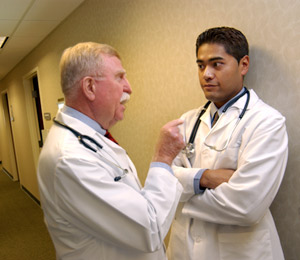 “Low grade” microaggressions between hospital workers and unprofessional behaviour like yelling or eye-rolling are having outsized impacts on staff morale, researchers are arguing.
“Low grade” microaggressions between hospital workers and unprofessional behaviour like yelling or eye-rolling are having outsized impacts on staff morale, researchers are arguing.
While serious bullying and sexual harassment are well documented problems in hospitals, there are calls for more to be done to stamp out behaviours which often go unreported at the lower end of the spectrum.
This can include doctors being unapproachable or pedantic, refusing to make eye contact or repeatedly interrupting when others are speaking.
But while these behaviours are all considered unprofessional, survey results show many have been normalised across Australian health services, according to a study in BMC Health Services Research.
The examples came from the 2017-18 Longitudinal Investigation of Negative Behaviours (LION) survey, which asked hospital workers in three Australian states what unprofessional behaviour they had experienced at work.
Some 1636 hospital staff responded, 11% of whom were doctors, along with nurses (45%), allied health workers (16%) and non-clinical support staff (28%).
Sexism and harassment remained key issues, with some respondents even describing examples of doctors sharing pornographic images in the workplace.
However, a major source of complaints centred around what the authors termed lower grade negative behaviours or “incivility”, such as “working with headphones on”, general unfriendliness or “failing to greet colleagues”.
Others included doctors raising their voices at nurses for no reason and rudeness such as sarcasm or sighing when a nurse began talking.
“People coming into work in a bad mood,” was one complaint in the survey. “Or people being passive aggressive about things not being done or not being done right…”